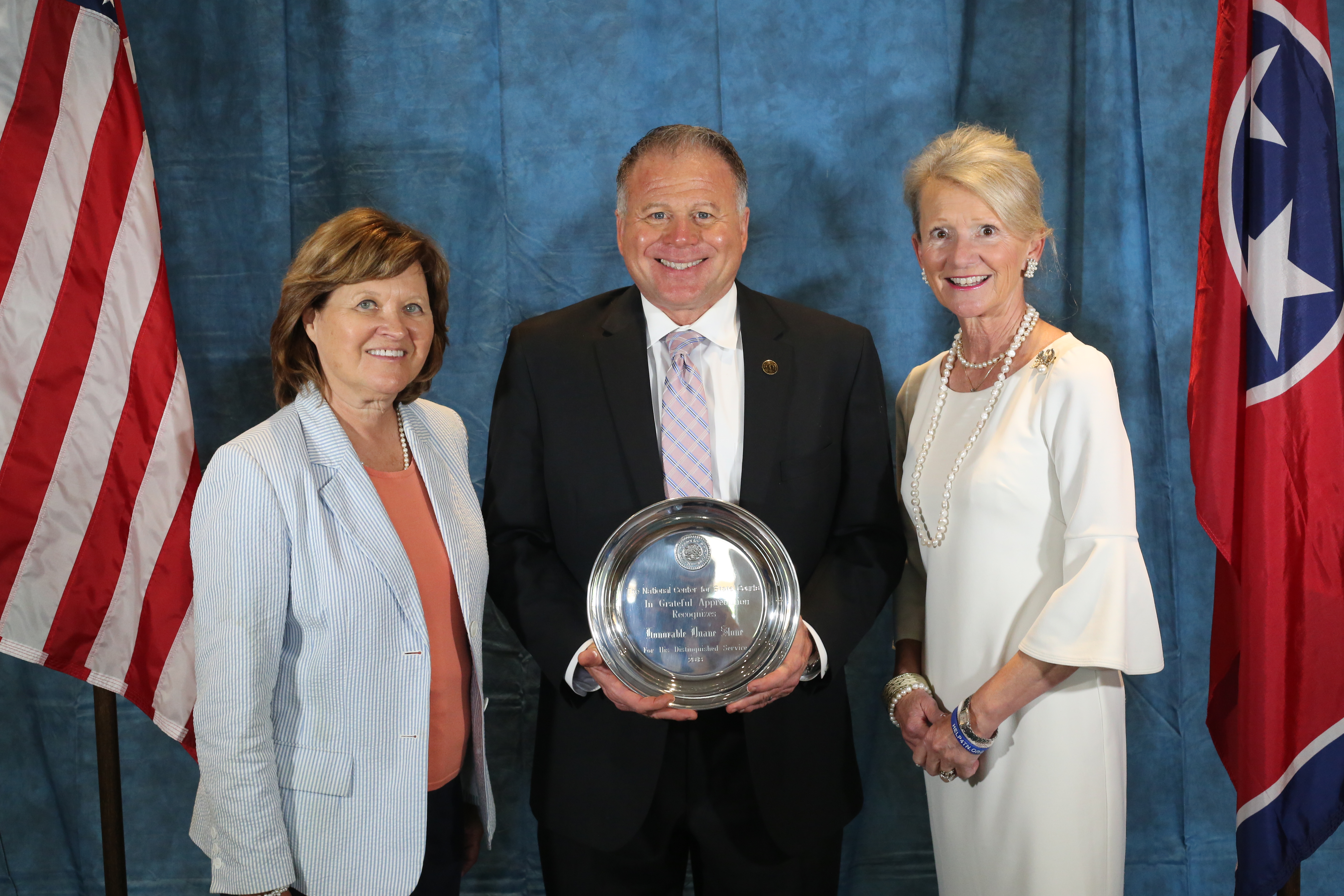Fourth Judicial District Circuit Court Judge Duane Slone, whose groundbreaking work in the courtroom has given new hope to many battling addiction issues, was recently awarded the National Center for State Courts Distinguished Service Award. NCSC President Mary McQueen presented Judge Slone with the award during the Tennessee Judicial Conference in June.
“He’s been an innovator, an initiator, a visionary at the national, the local, and the regional level,” McQueen said.
In particular, she cited Judge Slone’s close involvement with the NCSC-coordinated, multistate Regional Judicial Opioid Initiative (RJOI). Judge Slone serves as the chairman of that first-of-its-kind undertaking, which McQueen said is now being emulated by other states and regions. RJOI has eight member states in the Midwest and Southeast and is focused on prescription drug monitoring between the states, regional treatment capacity, and child welfare, including interstate foster care placements.
McQueen also highlighted the pioneering TN ROCS docket, a program Judge Slone started in his Jefferson County courtroom to serve those struggling with addiction who are not deemed high enough risks to qualify for participation in a recovery court program. In many cases, these are repeat, non-violent offenders. A significant number are also young women with children, as McQueen pointed out in further describing the reason for the award.
“Judge Slone has used his ingenuity and his creativity to come up with less punitive ways to reach those who are affected by the opioid crisis, especially young mothers with babies,” McQueen said. “For his work on the opioid crisis, his vision, his courage, his empathy, his representativeness of all of you, the National Center is conveying its Distinguished Service Award this year to Judge Duane Slone.”
In accepting the award, Judge Slone took time to thank his fellow judges in the 4th Judicial District as well as those who have taken part in the TN ROCS—or Recovery Oriented Compliance Strategies—docket.
“I’d have no story to tell if it wasn’t for the incredibly hard work of the people I get to serve with in the 4th Judicial District,” he said. “And I’d have no story to tell if it wasn’t for the brave men and women that we attempt to serve who are trying to recover from the hell of addiction.”
He added that the people of his home state are never far from his mind when he travels around the country to further the fight against opioids.
“Your spirit travels with me,” he said.
The development of the TN ROCS docket was partially born out of a life-changing development. Judge Slone was already running a Recovery Court program in 2011 when he and his wife, Gretchen, adopted a young boy, Joseph, who had been born with neonatal abstinence syndrome. The experience spurred Judge Slone to try to understand as never before the tenacious hold that drugs can have on an addict’s life.
“I had to know what was so powerful that a woman with a baby inside of her could continue to use drugs throughout a pregnancy,” he said in 2018 after a TN ROCS training and informational session for fellow judges and other professionals involved in the criminal justice system.
He soon learned that opioid addiction, which can result in cravings 10 times more powerful than hunger pains, left many addicted mothers feeling hopeless and with no other option than to use. In other words, he came to see, “That for my son’s birth mother, continuing to use opioids was a matter of survival.”
In the years since its inception, the TN ROCS docket has had a noticeably positive impact on the lives of addicted mothers. An informational review of the program three years in showed, for instance, that 34 babies had been born to docket participants. Thirty of those children’s mothers were able to retain custody.
In addition to his work with the RJOI and the TN ROCS docket, Judge Slone also serves as the chairman of the Tennessee Judicial Opioid Initiative.
Watch the video of Judge Slone receiving his award.

